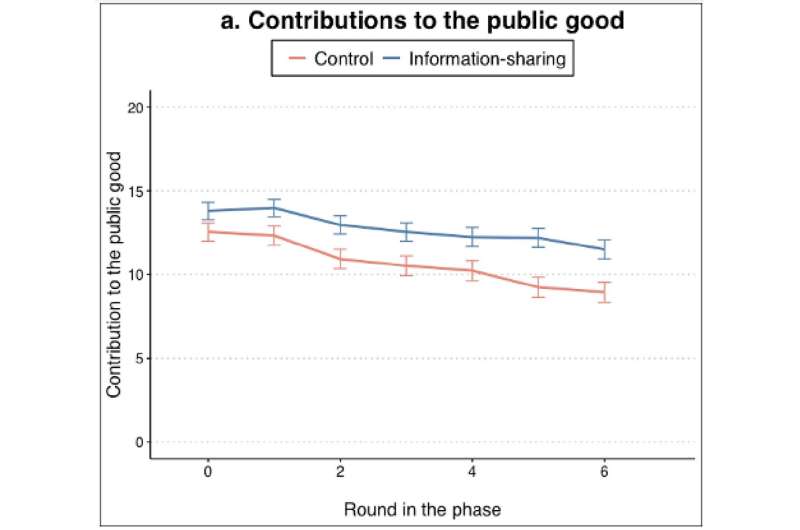Study shows that information-sharing prevents selfishness from becoming contagious by raising reputational concerns
How is cooperation affected when people can receive secondhand information about what others are contributing?
Ashley Harrell and Tom Wolff investigated this question through an online cooperation game. Participants were recruited from a large subject pool of university students and other adults, maintained by the Interdisciplinary Behavioral Research Center at Duke University. The work is published in the journal PNAS Nexus.
Over 200 participants were placed in groups of six to 10; however, each participant was only linked to some of the other participants. In the control condition, players could only see the contributions of their direct network ties, but in the experimental condition, each player could choose to send information about their ties’ contributions to their other ties.
Overall, groups that could share information contributed more than control groups. Participants commonly chose to share information and, when they did, were most likely to share information about contributions that were significantly lower than average. When a participant’s contribution information was shared, the exposed participants were aware of the sharing, and tended to contribute more on the next round.
A second study with 165 participants replicated the main finding that information sharing increases contributions. The second study also found that a fully transparent game with all contributions visible to all players did not significantly increase contributions above the information-sharing condition.
According to the authors, information-sharing prevents selfishness from becoming contagious by reminding participants of the possible reputational consequences of low contributions.
More information:
Ashley Harrell et al, Information-sharing and cooperation in networked collective action groups, PNAS Nexus (2023). DOI: 10.1093/pnasnexus/pgad399
Citation:
Study shows that information-sharing prevents selfishness from becoming contagious by raising reputational concerns (2023, December 20)
retrieved 20 December 2023
from https://phys.org/news/2023-12-information-sharing-selfishness-contagious-reputational.html
This document is subject to copyright. Apart from any fair dealing for the purpose of private study or research, no
part may be reproduced without the written permission. The content is provided for information purposes only.

How is cooperation affected when people can receive secondhand information about what others are contributing?
Ashley Harrell and Tom Wolff investigated this question through an online cooperation game. Participants were recruited from a large subject pool of university students and other adults, maintained by the Interdisciplinary Behavioral Research Center at Duke University. The work is published in the journal PNAS Nexus.
Over 200 participants were placed in groups of six to 10; however, each participant was only linked to some of the other participants. In the control condition, players could only see the contributions of their direct network ties, but in the experimental condition, each player could choose to send information about their ties’ contributions to their other ties.
Overall, groups that could share information contributed more than control groups. Participants commonly chose to share information and, when they did, were most likely to share information about contributions that were significantly lower than average. When a participant’s contribution information was shared, the exposed participants were aware of the sharing, and tended to contribute more on the next round.
A second study with 165 participants replicated the main finding that information sharing increases contributions. The second study also found that a fully transparent game with all contributions visible to all players did not significantly increase contributions above the information-sharing condition.
According to the authors, information-sharing prevents selfishness from becoming contagious by reminding participants of the possible reputational consequences of low contributions.
More information:
Ashley Harrell et al, Information-sharing and cooperation in networked collective action groups, PNAS Nexus (2023). DOI: 10.1093/pnasnexus/pgad399
Citation:
Study shows that information-sharing prevents selfishness from becoming contagious by raising reputational concerns (2023, December 20)
retrieved 20 December 2023
from https://phys.org/news/2023-12-information-sharing-selfishness-contagious-reputational.html
This document is subject to copyright. Apart from any fair dealing for the purpose of private study or research, no
part may be reproduced without the written permission. The content is provided for information purposes only.
